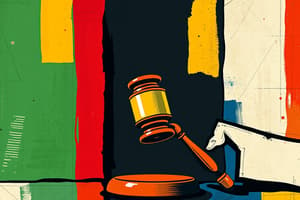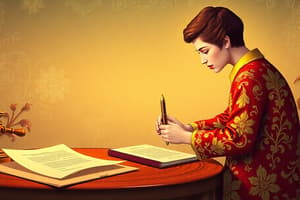Podcast
Questions and Answers
According to the Deeds Registry Act (DRA), what defines a 'notary public' in relation to a document?
According to the Deeds Registry Act (DRA), what defines a 'notary public' in relation to a document?
- An individual authorized by the Chief Justice to notarize documents.
- A person practicing as such in the place where the document is executed. (correct)
- A legal practitioner admitted to practice in any country.
- Someone who has passed examinations in notary public practice.
What is the role of the Chief Justice (CJ) under S. 54 of the LPA regarding regulations for notaries?
What is the role of the Chief Justice (CJ) under S. 54 of the LPA regarding regulations for notaries?
- The CJ directly admits individuals as notaries without consultation.
- The CJ, in consultation with the Minister and the Council, can make regulations prescribing matters under the Act, excluding fees. (correct)
- The CJ is responsible for setting the fees for notary public examinations.
- The CJ only oversees the historical aspects of notarial practice.
According to S. 9 of the LPA, what must an individual satisfy a court to be admitted as a notary?
According to S. 9 of the LPA, what must an individual satisfy a court to be admitted as a notary?
- They must be recommended by three sitting judges of the High Court.
- They must be a fit and proper person and have resided in Botswana for at least five years.
- They must be a fit and proper person, have no pending removal proceedings, and have passed the required examinations. (correct)
- They must have practiced law for ten years and contributed to legal scholarship.
In the context of land transfer documents in Botswana, what does S. 17 of the DRA identify as being dealt with by a notary?
In the context of land transfer documents in Botswana, what does S. 17 of the DRA identify as being dealt with by a notary?
What impact did the S.I. 72 of 1996 have on individuals obtaining an LLB degree from the University of Botswana?
What impact did the S.I. 72 of 1996 have on individuals obtaining an LLB degree from the University of Botswana?
According to Masuku J. in Re Tebo Tracy Monyeki - Moyo, MISCA F180 of 2005, who is qualified to certify the fitness of a petitioner for admission as a notary or conveyancer?
According to Masuku J. in Re Tebo Tracy Monyeki - Moyo, MISCA F180 of 2005, who is qualified to certify the fitness of a petitioner for admission as a notary or conveyancer?
What historical role were 'tabelliones' known for during the Roman Republic and Empire?
What historical role were 'tabelliones' known for during the Roman Republic and Empire?
From which group of individuals is the word 'notary' derived?
From which group of individuals is the word 'notary' derived?
What was the significance of the Cape Colony Act, No. 12 of 1858?
What was the significance of the Cape Colony Act, No. 12 of 1858?
What action did Emperor Justinian take that influenced the historical development of notarial practice?
What action did Emperor Justinian take that influenced the historical development of notarial practice?
In the historical context of the Netherlands, what was the primary role of notaries?
In the historical context of the Netherlands, what was the primary role of notaries?
What was the purpose of the Placaat (Edict) by Charles V of 2 March 1524?
What was the purpose of the Placaat (Edict) by Charles V of 2 March 1524?
What was the first piece of legislation traced in the Bechuanaland Protectorate related to legal practitioners?
What was the first piece of legislation traced in the Bechuanaland Protectorate related to legal practitioners?
Prior to legislation in the Bechuanaland Protectorate, how did notarial practice likely begin, according to the provided information?
Prior to legislation in the Bechuanaland Protectorate, how did notarial practice likely begin, according to the provided information?
What requirement was prescribed in South Africa's "post – colonial" legislation (Attorneys Act, 53 of 1979) for admission as an attorney?
What requirement was prescribed in South Africa's "post – colonial" legislation (Attorneys Act, 53 of 1979) for admission as an attorney?
What function did 'librarii' serve during the time of the Roman Republic and Empire?
What function did 'librarii' serve during the time of the Roman Republic and Empire?
What was a key historical development related to notarial practice during the time of the Roman Empire?
What was a key historical development related to notarial practice during the time of the Roman Empire?
What influence did Dutch East India Company Commissioners have on notarial practice at the Cape in 1793?
What influence did Dutch East India Company Commissioners have on notarial practice at the Cape in 1793?
Prior to Act No. 11 of 1903, who was eligible for summary admission as a notary in the Cape Colony?
Prior to Act No. 11 of 1903, who was eligible for summary admission as a notary in the Cape Colony?
What historical figures or groups commonly utilized scribes in Biblical times?
What historical figures or groups commonly utilized scribes in Biblical times?
Flashcards
Notary Public (DRA Definition)
Notary Public (DRA Definition)
According to the Deeds Registry Act (DRA), a notary public is someone practicing as such where a document is executed.
Notary (LPA Definition)
Notary (LPA Definition)
According to the Legal Practitioners Act (LPA), a notary is a legal practitioner duly admitted as a notary public in Botswana.
Documents a Notary Deals With (Botswana)
Documents a Notary Deals With (Botswana)
In Botswana as per S. 17 of the DRA, documents by which 'other real rights' in immovable property are conveyed, identified as 'deeds of cession' attested by a notary public.
LPA Requirements for Notary Practice
LPA Requirements for Notary Practice
Signup and view all the flashcards
Qualities Needed to be a Notary (Botswana)
Qualities Needed to be a Notary (Botswana)
Signup and view all the flashcards
Chief Justice's Power (LPA)
Chief Justice's Power (LPA)
Signup and view all the flashcards
LLB Exam Exemption (Botswana)
LLB Exam Exemption (Botswana)
Signup and view all the flashcards
Fitness Certification (Notary Admission)
Fitness Certification (Notary Admission)
Signup and view all the flashcards
Legality of CJ's Exemption Notice
Legality of CJ's Exemption Notice
Signup and view all the flashcards
Notarial Practice - Historical Significance
Notarial Practice - Historical Significance
Signup and view all the flashcards
Universal Recognition of Notarial Duties
Universal Recognition of Notarial Duties
Signup and view all the flashcards
Role of Scribes (Biblical Times)
Role of Scribes (Biblical Times)
Signup and view all the flashcards
Roman Scribe Equivalents
Roman Scribe Equivalents
Signup and view all the flashcards
Role of Librarii
Role of Librarii
Signup and view all the flashcards
Tabelliones responsibilities
Tabelliones responsibilities
Signup and view all the flashcards
Role of Tabularii
Role of Tabularii
Signup and view all the flashcards
Actuarii/Notarii role
Actuarii/Notarii role
Signup and view all the flashcards
Justinian's Archives
Justinian's Archives
Signup and view all the flashcards
Origin of 'Notary'
Origin of 'Notary'
Signup and view all the flashcards
Placaat (Edict) of 1524
Placaat (Edict) of 1524
Signup and view all the flashcards
Study Notes
Introduction to Notarial Practice
- The study of notarial practice includes defining who notaries are.
- Notaries' main duties and responsibilities are detailed.
- A history of the office of the notary is provided.
Who is a Notary?
- Deeds Registry Act (DRA) S. 2 defines a "notary public" as someone practicing as such where a document is executed.
- Legal Practitioners Act (LPA) S. 2 defines a "notary" as a "legal practitioner duly admitted as a notary public in Botswana".
- Under the LPA, a legal practitioner is an advocate, attorney, notary, or conveyancer.
- Notaries public are legal practitioners dealing with specific documents within a legal jurisdiction.
- The documents notaries handle must show they're admitted to practice.
- DRA S. 17 identifies land transfer documents, such as "deeds of cession" attested by a notary public, as documents notaries deal with in Botswana.
Admission as a Notary
- LPA Ss 8 and 9 cover admission to practice as a notary or conveyancer.
- Under S. 8, one must be admitted and enrolled as an attorney.
- Under S. 9, one must satisfy a court of fitness and propriety.
- There must be no removal order or pending proceedings.
- One must pass examinations on notarial practices, functions and duties.
- LPA S. 54 empowers the Chief Justice, with the Minister and Council's consultation, to make regulations.
- S.I. 72 of 1996 exempts those passing notary public/conveyancing exams as part of their University of Botswana LLB degree from other legal practitioner exams.
- In Re Tebo Tracy Monyeki - Moyo, MISCA F180 of 2005, Masuku J. stated only a conveyancer/notary could certify a petitioner's fitness for notary or conveyancer admission.
- The Chief Justice's exemption notice was unlawful because it amended statutory provisions.
- Other judges admit attorneys passing conveyancing and notarial practice exams in the University based on the exemption notice.
- Passing LAW 532 and 533 at the University of Botswana remains important for students.
Historical Snapshots
- Notarial practice is possibly the oldest specialization in legal practice.
- Civilizations influencing common law recognized professionals with duties similar to modern notaries.
- Historical examples include biblical communities for canon law contributions.
- Other examples are the Roman Empire, Roman Dutch law in the Netherlands and at the Cape of Good Hope, and early colonial law in the Bechuanaland protectorate.
- In biblical times, Hebrew Kings and Pharaohs employed scribes.
- Scribes were shorthand writers that recorded meetings and kept copies of important documents.
- Scribes can read and write, and they can be free men or slaves.
- The Bible is attributed to inspired men that likely dictated thoughts and inspiration to scribes, such as Baruch, Son of Neriah, writing for the Prophet.
- During the Roman Republic and Empire, functionaries like scribes were known as librarii, tabelliones, tabularii, actuarii, and notarii.
- Librarii were attached to Magistrates to record proceedings and produce public meeting accounts.
- Tabelliones were archive keepers responsible for drawing up legal documents and agreements, setting up stalls in marketplaces, and forming a special state order.
- Tabularii took charge of public documents and registers.
- Actuarii/notarii were initially shorthand writers taking notes for wealthy Romans in law courts.
- Emperor Justinian established archives for documents drawn by notarii.
- A distinction emerged between private and public document preparation.
- Private documents required witnesses for attestation.
- Public documents were drawn up before Judges/Bishops.
- Notarii stood in for Judges/Bishops and eventually took over the function.
- The word notary is derived from the notarii of the Roman Empire.
- It is uncertain when notaries began practicing in the Netherlands.
- The office was well-established by the 16th Century, which required regulation.
- A Placaat (Edict) by Charles V of 2 March 1524 restricted the establishment of such offices.
- Only approved persons of re-known could set up offices.
- The Edict provided for keeping copies and registers of acts passed by a notary.
- Section 45 and 46 of the LPA originated from this Edict.
- Notaries in the Netherlands were mainly preparing documents for clients.
- Notaries was also a reliable source of document copies.
- Attorneys, on the other hand, were mainly involved in litigation.
- The first notary was appointed at the Cape in 1672.
- In 1793, Dutch East India Company Commissioners issued regulations for notaries, but their authority was questionable.
- Licenses were issued to notaries from 1793-1858 without backing legislation.
- The practice form was carried over from the Netherlands but did not include admission restrictions.
- The Cape Colony Act, No. 12 of 1858 was the first legislation on the topic.
- The Supreme Court was empowered to make rules and regulations for practice as notaries and conveyancers.
- Initially, advocates studying in the Netherlands were admitted to practice as notaries.
- Later regulations provided for the summary admission of attorneys, and other persons apprenticed for 4 years.
- Act No. 11 of 1903 eventually stated that only attorneys were eligible for admission.
- Some notaries likely practiced in the Bechuanaland Protectorate before legislation and regulation.
- The Legal Practitioners Act of 1904 was the first legislation.
- The Act empowered the Resident Commissioner to admit those admitted in South Africa.
- South Africa prescribed practical exams for admission in "post-colonial" legislation (Attorneys Act, 53 of 1979).
Studying That Suits You
Use AI to generate personalized quizzes and flashcards to suit your learning preferences.




